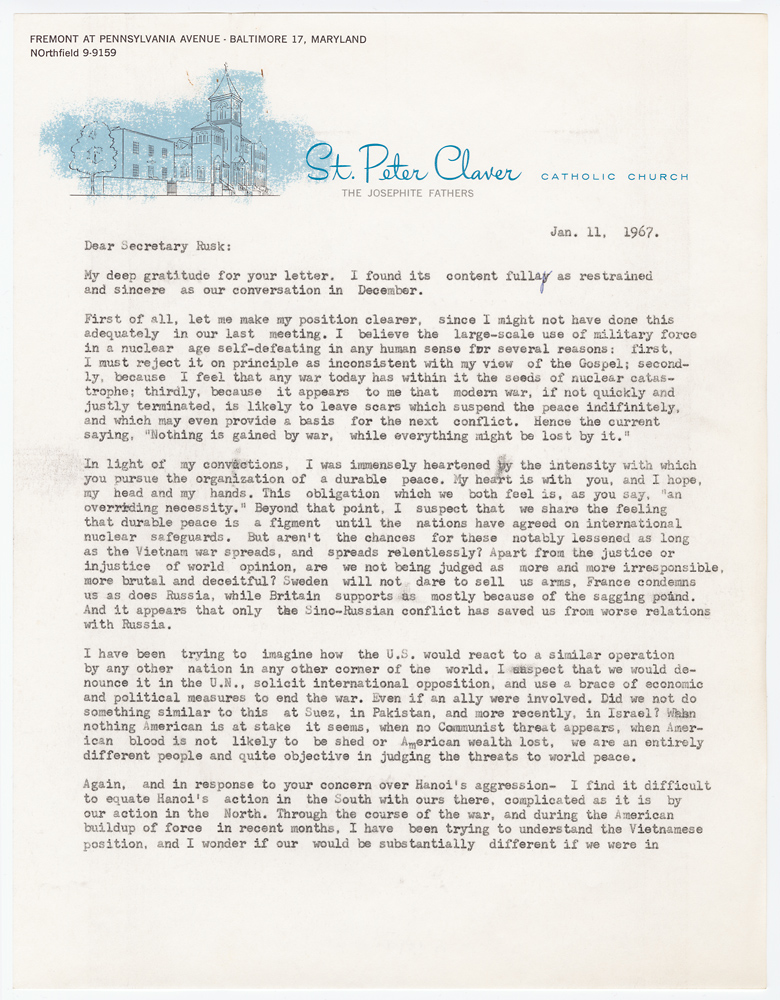 |
Letter from Philip Berrigan to Dean Rusk, January 11, 1967
 |
1 / 3 |
 |



| Collection: |
Cornell University Library |
| Date: |
1967-01-11 |
| Date of Digitization: |
2004 |
| Source: |
Daniel and Philip Berrigan Collection at the Division of Rare and Manuscript Collections, Cornell University Library |
| Original Dimensions: |
? |
| Creator: |
Berrigan, Philip, 1923-2002 |
|
|
Description:
In the letter to Secretary of State, Dean Rusk, Philip Berrigan discusses the political situation caused by the war in Vietnam, the wrongness and immorality of war. He urges Secretary Rusk to give peace a chance and offers his service as a possible emissary to meet Ho Chi Minh and start talks on ending the war.
Transcription: FREMONT AT PENNSYLVANIA AVENUE - BALTIMORE 17, MARYLAND
NOrthfield 9-9159
St. Peter Claver CATHOLIC CHURCH
THE JOSEPHITE FATHERS
Jan. 11, 1967.
Dear Secretary Rusk:
My deep gratitude for your letter. I found its content fully as restrained
and sincere as our conversation in December.
First of all, let me make my position clearer, since I might not have done this
adequately in our last meeting. I believe the large-scale use of military force
in a nuclear age self-defeating in any human sense for several reasons; first,
I must reject it on principle as inconsistent with my view of the Gospel; second-
ly, because I feel that any war today has within it the seeds of nuclear catas-
trophe; thirdly, because it appears to me that modern war, if not quickly and
justly terminated, is likely to leave scars which suspend the peace indifinitely,
and which may even provide a basis for the next conflict. Hence the current
saying, ''Nothing is gained by war, while everything might be lost by it."
In light of my convictions, I was immensely heartened by the intensity with which
you pursue the organization of a durable peace. My heart is with you, and I hope,
my head and my hands. This obligation which we both feel is, as you say, "an
overriding necessity." Beyond that point, I suspect that we share the feeling
that durable peace is a figment until the nations have agreed on international
nuclear safeguards. But aren't the chances for these notably lessened as long
as the Vietnam war spreads, and spreads relentlessly? Apart from the justice or
injustice of world opinion, are we not. being judged as more and more irresponsible,
more brutal and deceitful? Sweden will not dare to sell us arms, France condemns
us as does Russia, while Britain supports us mostly because of the sagging pound.
And it appears that only the Sino-Russian conflict has saved us from worse relations
with Russia.
I have been trying to imagine how the U.S. would react to a similar operation
by any other nation in any other corner of the world. I suspect that we would de-
nounce it in the U.N., solicit international opposition, and use a brace of economic
and political measures to end the war. Even if an ally were involved. Did we not do
something similar to this at Suez, in Pakistan, and more recently, in Israel? When
nothing American is at stake it seems, when no Communist threat appears, when Amer-
ican blood is not likely to be shed or American wealth lost, we are an entirely
different people and quite objective in judging the threats to world peace.
Again, and in response to your concern over Hanoi's aggression- I find it difficult
to equate Hanoi's action in the South with ours there, complicated as it is by
our action in the North. Through the course of the war, and during the American
buildup of force in recent months, I have been trying to understand the Vietnamese
position, and I wonder if our would be substantially different if we were in
|




